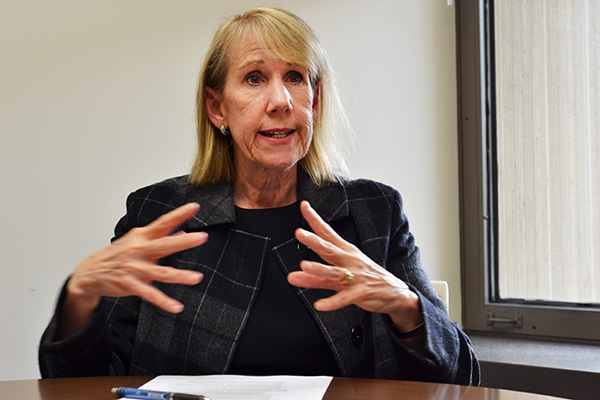Professors are facing competition for time with GW’s librarians, as more of their colleagues ask their students to learn about the research tools the University offers.
University Librarian Geneva Henry said demand for help from librarians has expanded beyond University Writing classes. GW has seen more requests from faculty who teach writing-intensive courses and want students to work with primary sources in Gelman Library’s special collections, like the Washingtoniana and Edward Kiev Judaica collections.
Last year, GW’s library assistants and specialists worked with more than 7,300 students in 772 sessions.
Henry said librarians want to work with as many classes as they can, but time restraints have forced them to consider new ways to engage with faculty and students throughout the week.
“They are now starting to think about new ways that they can reach out with that kind of information. Are there remote sessions they could do? Are there alternative ways they can present the research or research instruction to the students, maybe with multiple courses?” Henry said.
To increase their reach, librarians could create online modules or work with several classes at once, she said.
Librarians have typically worked with freshmen in University Writing classes to introduce new students to GW’s libraries system. Henry said other writing teachers are looking to replicate those experiences in their own classes, so students can continue learning about the resources to which they have access.
Each University Writing professor is partnered with a research librarian. The librarian typically visits the classroom to talk with students about the various resources that GW Libraries offer. The librarians also make themselves available to the students during the research process.
Cayo Gamber, an assistant professor in the University Writing program, said the librarian who works with her class is “essential to the success of my course.”
“Not only has [the librarian] stepped in to save vital components of the course, but he and I have collaborated on an essay about our and our students’ work on this project. Our essay has been accepted for publication once the book finds a publishing home,” she said.
Daina Eglitis, an associate professor of sociology, said she often teaches courses that require students to access databases from the Bureau of Labor Statistics or Centers for Disease Control. Eglitis has worked with research librarians to assist her students in navigating the databases efficiently.
Undergraduates who wouldn’t typically use primary sources have worked with with history professor Christopher Klemek in the library’s Washingtoniana collection, Henry said. GW has eight special collections, including ones on American labor history and an Africana research center.
Associate professor of writing Phyllis Ryder said her own research skills have improved since partnering with the librarians.
“Now I know where to turn for what kinds of sources, which databases have access to more recent materials and which are better for historical sources, and so on,” she said.
Muriel Atkin, a professor of history who teaches a Writing in the Disciplines course, said a librarian reached out to her last year and has worked with her classes ever since. The relationship has let her introduce more resource options to her students, she said, and many might not have known about those opportunities before the class.
“To know about the range of materials that the library has, both in hard copy and online, so that when they want to find out more about something, not only just for research projects but in general, they can avail themselves of information,” she said.
That engagement has helped to bring more professors into Gelman Library – a goal Henry laid out when she started at GW last year.
She’s also tried to lure professors by highlighting how special collections can supplement their research and teaching.
Bringing professors into the library, which historically serves as the research hub for any university, can help grow interdisciplinary work, a major focus of the University’s strategic plan, Henry said.
“It enables the conversations to happen, and then the conversations take a life on their own where the faculty start to surface these issues, and then realize they have a lot to talk about with each other,” she said.
Mary Ellen McIntire contributed reporting.






